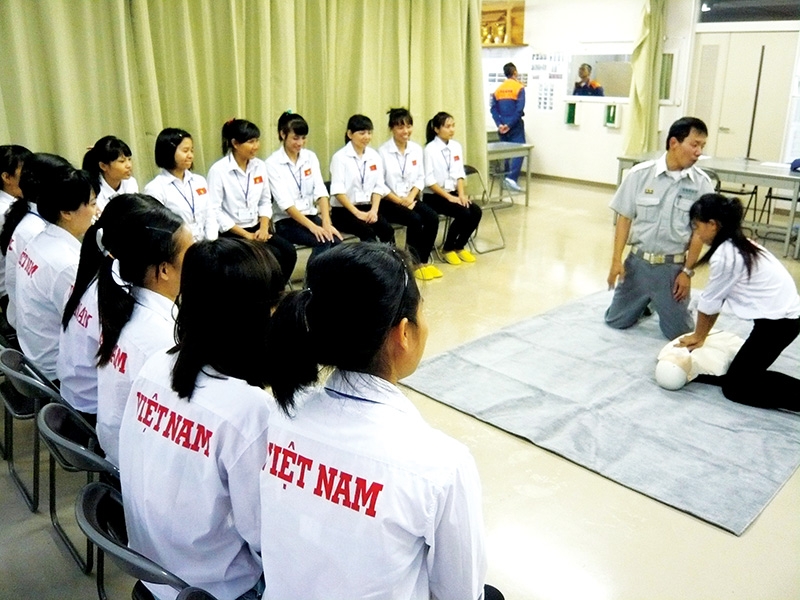Labour exporters pushed to the edge by pandemic
 |
| Many aspiring guest workers have delayed plans to go abroad |
Since the beginning of March, BIC International Co., Ltd. has been hanging posters and advertisements across Hai Duong city as well as on social networking sites like Facebook and Zalo to call for those interested in studying or working abroad. Though the company has been to recruiting workers and students to travel to South Korea and Japan, months have passed and no-one has applied.
With interrupted business and no revenue, BIC International was forced to lay off almost all of its employees, and only one accountant was kept. The country also had to liqTwo out of three language teachers for the company also had to liquidate their contracts.
Discussing the difficult situation, BIC director Nguyen Viet Chinh said, “The labour export market has been almost entirely frozen by COVID-19. Before the Lunar New Year, we had more than 10 students learning the language to go to South Korea in the next few months. However, most have now dropped out. Only a couple of students are trying to finish the Korean language course, but we do not know when they can depart.”
In the last five months, the company has been regularly posting information about Japanese and South Korean training courses, and a number of counselling sessions for those wishing to work there have also been held in preparation for the two countries to gradually ease visa restrictions for Vietnamese workers, but the situation has yet to improve.
It is a common situation for many enterprises operating in the same fields. An employee of Hoa Binh Human Resource Co., Ltd., based in Hoang Mai district of Hanoi, said the company has let employees quit their jobs since the beginning of the year due to difficulties in recruiting people to work abroad.
In fact, the demand for labour recruitment in many foreign enterprises is still high. Due to fear of the pandemic among foreign business owners and domestic workers and the suspension of receiving foreign workers in some key markets, labour export activity has stalled.
Apart from workers that have been granted visas, the common path for many Vietnamese workers is to find a temporary job and wait for the pandemic to be controlled, then register for vocational training and language learning.
Thu Thuy (32) currently lives in Nam Dinh and applied for an apprenticeship to work in Japan but the plan was cancelled because of the pandemic. “Working abroad with a high income has been my dream for a long time. But at this time, the pandemic is not controlled and Japan is also restricting the number of foreign workers, so I decided to delay the course and wait,” she said.
Over the past month the labour export market has been showing signs of recovery as markets such as South Korea, Japan, and Taiwan (which account for more than 90 per cent of the total number of Vietnamese workers) seek to receive Vietnamese workers to restore production and business after the pandemic.
Since May, Taiwan has opened up for a large number of Vietnamese workers because while Indonesia and the Philippines have been the main sources of labour for the market, both countries are still heavily affected by the global health crisis.
Meanwhile, in July the Human Resources Development Service of Korea organised Korean language proficiency tests in Hanoi, Ho Chi Minh City, and Danang, giving hope that the market would be soon reopened.
At the end of July, Japan announced the re-issuance of visas for Vietnamese workers.
However, in the first stage of receiving such workers, both countries have priority policies for skilled workers in machinery and technology-related industries. Meanwhile, Vietnamese labour exports are mainly unskilled and have lower value than many neighbouring countries.
To support businesses operating in labour export and facing difficulties, Dang Sy Dung, deputy director of the Department of Overseas Labour (DoLAB), said that the department has collaborated with the Ministry of Finance to develop Circular No.54/2020/TT-BTC dated June 12, regulating a reduction of 50 per cent of fees for the verification of papers and documents, as well as fees for permits for sending workers abroad under definite-term contracts until December 31.
In addition, the simplification of administrative procedures and the enhancement of online settlement for contract registration, licensing for enterprises, and research on deferred payment of the contribution of 1 per cent of the service fee revenues of enterprises to the Fund for Overseas Employment Support during the pandemic is also actively proposed by the DoLAB.
According to a representative of the DoLAB, in order to have qualified candidates meet the rising recruitment needs of post-pandemic labour markets, businesses now need to link with training institutions for both vocational and foreign language training to propagate and guide workers wishing to work abroad.
What the stars mean:
★ Poor ★ ★ Promising ★★★ Good ★★★★ Very good ★★★★★ Exceptional
 Tag:
Tag:
Themes: Human Capital 4.0
Related Contents
Latest News
More News
- NAB Innovation Centre underscores Vietnam’s appeal for tech investment (January 30, 2026 | 11:16)
- Vietnam moves towards market-based fuel management with E10 rollout (January 30, 2026 | 11:10)
- Vietnam startup funding enters a period of capital reset (January 30, 2026 | 11:06)
- Vietnam strengthens public debt management with World Bank and IMF (January 30, 2026 | 11:00)
- PM inspects APEC 2027 project progress in An Giang province (January 29, 2026 | 09:00)
- Vietnam among the world’s top 15 trading nations (January 28, 2026 | 17:12)
- Vietnam accelerates preparations for arbitration centre linked to new financial hub (January 28, 2026 | 17:09)
- Vietnam's IPO market on recovery trajectory (January 28, 2026 | 17:04)
- Digital economy takes centre stage in Vietnam’s new growth model (January 28, 2026 | 11:43)
- EU Council president to visit Vietnam amid partnership upgrade (January 28, 2026 | 11:00)






















 Mobile Version
Mobile Version